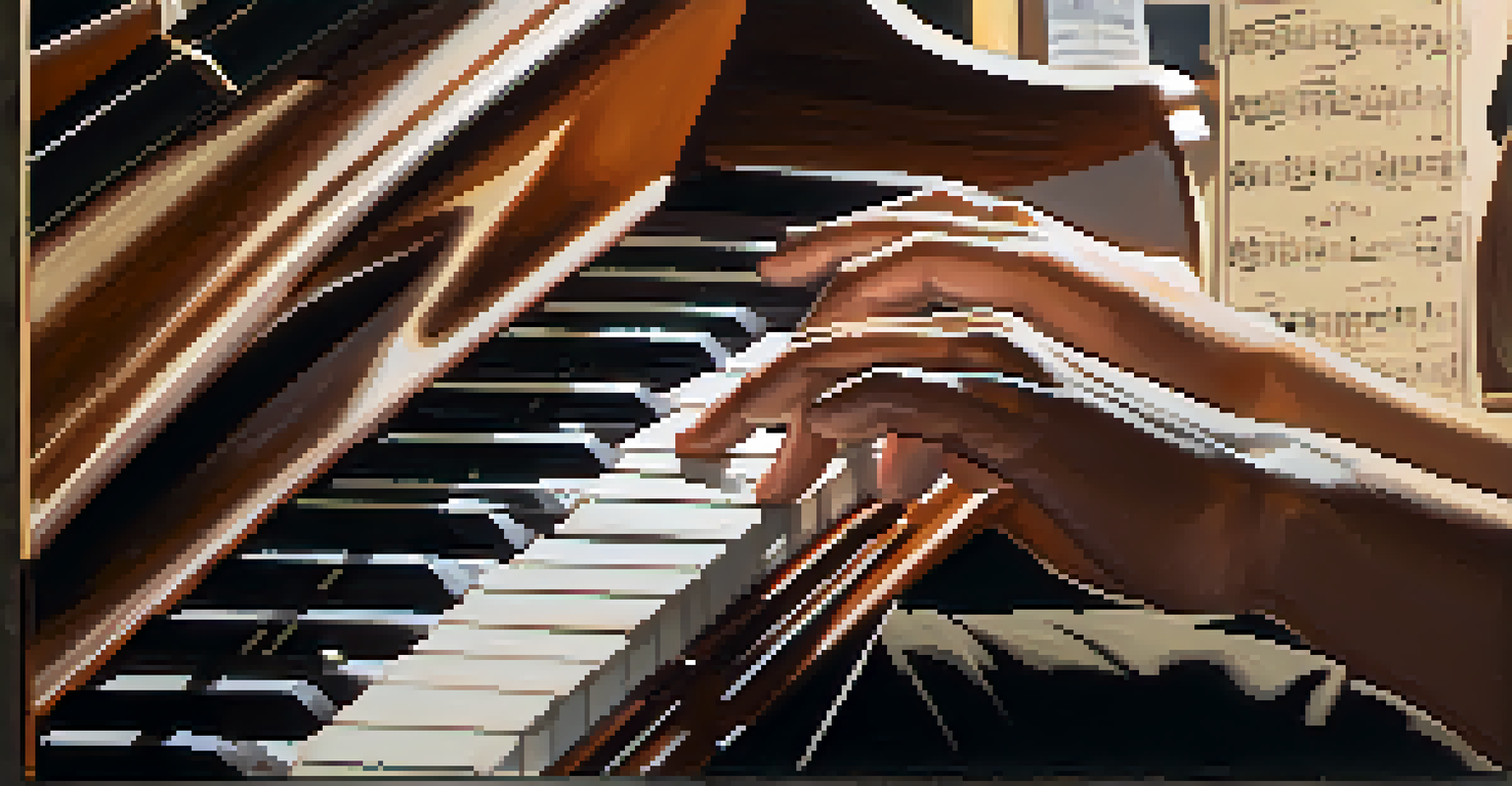Meditation Practices to Help Musicians Overcome Performance Anxiety

Understanding Performance Anxiety in Musicians
Performance anxiety is a common experience for musicians, often leading to feelings of fear and self-doubt. This anxiety can manifest physically, causing symptoms like shaking hands, rapid heartbeat, or even blanking out on stage. Understanding that this is a normal reaction can be the first step towards overcoming it.
The greatest weapon against stress is our ability to choose one thought over another.
Many musicians face pressure to meet both personal and audience expectations, which can exacerbate anxiety. The fear of judgement can create a mental block that hinders performance. Recognizing these triggers is essential for addressing anxiety effectively.
By acknowledging that performance anxiety is prevalent among musicians, individuals can feel less isolated in their experiences. This understanding paves the way for practical solutions, such as incorporating meditation practices into their routine.
The Benefits of Meditation for Musicians
Meditation offers numerous benefits that can help musicians manage performance anxiety. It promotes relaxation, enhances focus, and fosters a sense of inner peace, all of which are key to overcoming anxiety. Regular meditation practice can create a mental space where musicians can let go of self-doubt.

Additionally, meditation encourages mindfulness, helping musicians stay present during performances. This presence can reduce the grip of anxiety, allowing for a more authentic expression of their artistry. The calming effects of meditation can also improve overall well-being, making it easier to cope with stress.
Meditation Reduces Performance Anxiety
Incorporating meditation practices can significantly help musicians manage and alleviate performance anxiety.
Ultimately, the benefits of meditation extend beyond the stage. Musicians who meditate often find that they approach their craft with renewed passion and creativity, transforming anxiety into a source of motivation rather than fear.
Breathing Techniques to Calm Nerves
One effective meditation practice for musicians is focused breathing. This technique involves taking slow, deep breaths to activate the body's relaxation response. By concentrating on their breath, musicians can create a calming rhythm that helps ease anxious thoughts.
Meditation is not a way of making your mind quiet. It’s a way of entering into the quiet that’s already there—buried under the 50,000 thoughts the average person thinks every day.
For example, the 4-7-8 breathing method is simple yet powerful. Inhale deeply through the nose for four counts, hold the breath for seven counts, and exhale slowly through the mouth for eight counts. This pattern not only calms the mind but also lowers heart rate, making it a go-to technique before performances.
Incorporating these breathing exercises into daily practice can help musicians build resilience against anxiety. Over time, they will find it easier to access this calm state, both on and off the stage, allowing for a more enjoyable performance experience.
Mindfulness Meditation for Enhanced Focus
Mindfulness meditation is another powerful tool for musicians dealing with performance anxiety. This practice involves paying attention to the present moment without judgement, which can significantly enhance focus. By training the mind to stay anchored in the present, musicians can reduce distractions and anxiety.
For instance, spending just a few minutes each day in mindfulness meditation can help musicians develop a greater awareness of their thoughts and feelings. This awareness allows them to recognize anxious thoughts without letting them take over, creating a sense of control during performances.
Breathing Techniques Calm Nerves
Focused breathing exercises, like the 4-7-8 method, can effectively calm the mind and body before performances.
As musicians become more proficient in mindfulness, they often report improved concentration and a more profound connection to their music. This shift not only alleviates anxiety but also deepens their overall musical experience, making each performance more fulfilling.
Visualization Techniques for Confidence
Visualization is a powerful technique that can help musicians overcome performance anxiety. This involves imagining a successful performance in vivid detail, which can boost confidence and reduce fear. By picturing themselves on stage, performing flawlessly, musicians can rewire their brains to associate performance with positive outcomes.
For example, a musician might spend time before a performance visualizing the audience's enthusiastic response and feeling the joy of playing their piece perfectly. This mental rehearsal acts as a dry run, making the actual performance feel more familiar and less intimidating.
Integrating visualization into their practice routine can help musicians approach performances with a sense of assurance. Over time, these positive visualizations can replace anxiety with excitement, transforming how they experience live music.
Progressive Muscle Relaxation for Tension Relief
Progressive muscle relaxation (PMR) is an effective meditation practice that can help musicians release physical tension related to anxiety. This technique involves systematically tensing and then relaxing different muscle groups, promoting overall relaxation. By learning to recognize and release tension, musicians can feel more at ease before and during performances.
For instance, a musician can start by tensing their toes for a few seconds before releasing the tension completely. Gradually working up through the body, they will notice how each muscle group relaxes, allowing stress to melt away. This practice can be especially beneficial right before stepping on stage.
Consistency Enhances Meditation Benefits
Establishing a regular meditation routine is key for musicians to experience lasting improvements in focus and creativity.
By incorporating PMR into their routine, musicians can cultivate a greater awareness of their body’s response to anxiety. This awareness empowers them to manage tension proactively, leading to a more confident and enjoyable performance.
Creating a Consistent Meditation Routine
Establishing a consistent meditation routine is crucial for musicians looking to manage performance anxiety. Just like practicing an instrument, meditation requires dedication and regularity for effective results. Setting aside a specific time each day for meditation can help make it a habit, ultimately leading to lasting benefits.
Musicians can start with just a few minutes each day, gradually increasing the duration as they become more comfortable with the practice. Whether it’s morning meditation to set a positive tone for the day or evening sessions to unwind, consistency is key.

Over time, a regular meditation practice will not only help reduce anxiety but also enhance overall performance skills. The discipline of meditation can translate into greater focus and creativity, making it an invaluable tool for any musician.
Final Thoughts on Meditation and Performance Anxiety
In conclusion, meditation can be a game-changer for musicians struggling with performance anxiety. By exploring various practices such as breathing techniques, mindfulness, visualization, and progressive muscle relaxation, musicians can find what works best for them. These practices not only alleviate anxiety but also enhance performance and creativity.
It's essential for musicians to remember that overcoming performance anxiety is a journey, not a destination. With patience and persistence, they can develop the mental tools needed to manage anxiety effectively. Embracing meditation is a valuable step in this journey.
As musicians continue to incorporate meditation into their lives, they will likely discover a newfound freedom in their performances. Ultimately, this journey can lead to more joyful, authentic, and confident musical expressions.